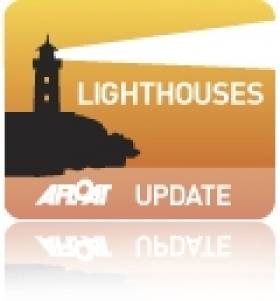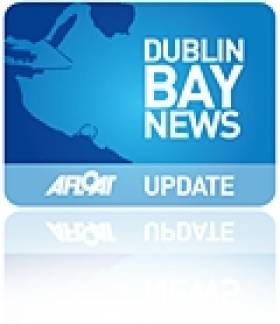Displaying items by tag: Irish lightships
Another Lightship Extinguished into History
#LIGHTSHIPS – As each day passes, quite literally chunks of Irish maritime heritage are been rapidly consigned to history, as work on scrapping the former lightship ALF Skua takes place on the North Quay in Arklow, writes Jehan Ashmore.
As the vessel lies forlornly alongside her River Avoca berth, a blowtorch cuts away in earnest at the steelwork. In tandem a crane-grabber lifts large sections of the red painted ship and loaded into an awaiting quayside truck.
What remains as of this week is only the hull, as the bridge, deckhouse structure and lantern have gone, having said that the latter structure was removed years ago.
When the lightship was towed into the port, several elected members of Arklow Town Council, with a seafaring back-round prevailed in the public body to acquire the lantern. The structure however still remains yet to be located to an appropriate site, as according to the council they have no definite plans for the lantern, though it is envisaged that it would be at least placed in a municipal location.
For decades the lightship served several stations off the Irish coastline, having been completed in 1960 by Philip & Sons of Dartmouth for the Commissioners of Irish Lights (CIL). Constructed of steel, the 134 foot lightship, cost £124,128 when launched in the Devon shipyard, though her crew were replaced when converted to an automatic light float (ALF) in 1981/82.
The vessel's designation as an ALF lasted for more than two decades until Irish Lights sold the lightship to Arklow Shipping Ltd in 2005, however she has since changed hands while moored in the Co. Wicklow port.
Nearby to where the Skua is berthed, a lantern belonging to an older lightship fleetmate, the Albratross (built 1925), was kept to form a distinctive landmark at the entrance to Arklow Marina.
With the diminishing Skua, it is believed that only two such ships survive on this island. The ALF Kittiwake (built 1959) as previously reported on Afloat.ie is in Dublin Port, however she shifted berths several months from her prominent position opposite the 02 Theatre to the jetty within Alexandra Basin, which is hidden away from general view in the working port.
The other lightship the Petrel, was built by Dublin Dockyard between 1913-15. She remains as a floating clubhouse for the Down Cruising Club in Strangford Lough, having been towed to the lough by the lighthouse tender ILV Isolda during the late 1960's.
As for the last lightship to serve, the honour was left to the ALF Gannet. She was stationed at South Rock, off Co. Down until her decommissioning in 2009 when Irish Lights replaced the lightship with a new 'Superbuoy'.
Crosbie’s Café Lightship Plan Rejected
Dublin City Council told Crosbie that consent for the use of the campshires for the bar had not been agreed to by the board of the Dublin Dockland Development Authority (DDDA), which owns the quays, "and that said permission will not be forthcoming".
Crosbie had received a letter from the then chief executive officer of the DDDA Paul Maloney in December 2008 saying that the authority was willing to let the development go ahead, subject to consent from the authority's executive board.
This permission will not know be forthcoming but the authority does feel that the ship should be used as a bar on the Liffey itself rather than on the campshires.
The Kittiwake has laid idle since 2007 when the vessel was purchased from the Commissioners of Irish Lights. She was the second last lightship to serve in Irish waters. During the 1980's she and several other lightships were converted from manned operation into automatic light-floats or ALF's. To read more about the last Irish lightship ALF Gannet click HERE.

























































